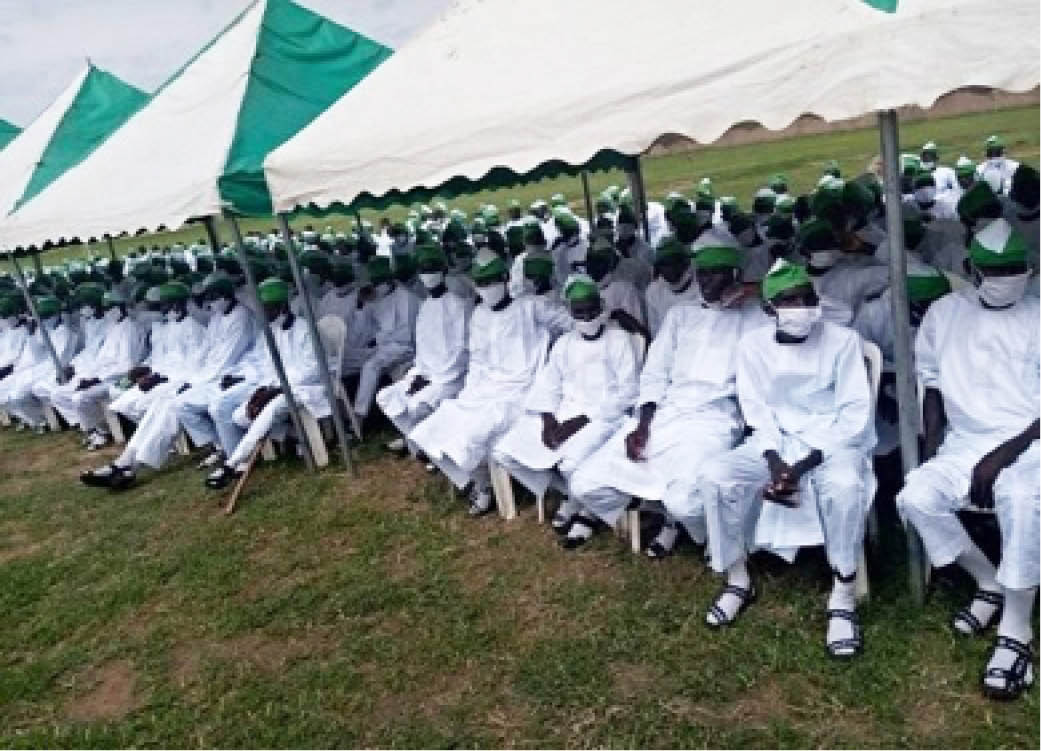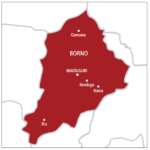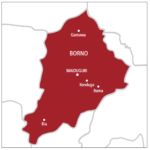Many Internally Displaced Persons (IDPs) in Borno, Yobe and Adamawa states, elders and security experts, on Wednesday supported the position of the Senate Committee on Army, which frowned at the deradicalisation of Boko Haram members.
They said the exercise was premature considering that the Boko Haram war had not been won yet. But some people said the federal government was not totally wrong, saying deradicalisation remained one of key components of ending war all over the world.
- Mallam Sidi: Inside the rehab of repentant Boko Haram members
- Boko Haram: 47 soldiers killed in Borno
The Chairman of the Senate Committee on Army, Senator Ali Ndume (APC, Borno), said on Wednesday that the deradicalisation, rehabilitation and reintegration of the repentant terrorists was not in order.
He said: “I am in disagreement with the government on the issue of deradicalising and reintegrating (repentant Boko Haram members). I still maintain that. You can’t be resettling people, pampering them while the war is on.
“The committee is on the same page and I believe many Nigerians are on the same page with this. In my village, mallams that are Muslims, not ordinary Muslims but mallams, elders above 60, were taken to an abattoir and slaughtered by Boko Haram. 75 of them,” he said.
Arrest those funding Boko Haram
Ndume also asked President Muhammadu Buhari to expedite action on the arrest and prosecution of Boko Haram sponsors.
Responding to a question on six Nigerians convicted in the United Arab Emirates (UAE) over “Boko Haram funding”, Ndume said those that were directly or indirectly involved in Boko Haram activities should be brought to book.
Daily Trust had exclusively reported how six Nigerians were convicted by an Abu Dhabi court in 2019 over links to Boko Haram funding.
Their families said they were wrongly convicted.
According to Ndume, “We are still calling on the Nigerian government to ensure that those that are directly or indirectly involved in Boko Haram activities should be brought to book and used as an example. I think we have not been up and doing on that,” he said.
How the idea of deradicalisation was hatched
Daily Trust reports that the deradicalisation exercise is part of Nigeria’s Operation Safe Corridor aimed at facilitating the rehabilitation of ex-insurgents.
It was also part of the carrot and stick approach of the government towards ending the over 11- year Boko Haram insurgency that has claimed thousands of lives, displaced millions and destroyed their economy.
The initiative was first proposed at the Nigerian National Security Council (NSC) meeting in September 2015, after which repentant Boko Haram members were encouraged to surrender and embrace peace.
During their stay at the deradicalisation camps such as the one in Gombe, they would be subjected to a combination of psychotherapy, art therapy and psycho-spiritual counselling.
They would also be subjected to skill acquisition programme, offered certificate of “psychosocial normalcy” and then reintegrated into the society.
However, those against releasing the ex-Boko Haram militants said many of them ended up re-joining the terror group. They said this was partly responsible for the inability of the Nigerian security forces to end the crisis.
Heal our wounds first – Borno residents
Some residents of Maiduguri yesterday described the deradicalisation exercise as “hasty,” saying the government should have healed the wounds of those who suffered in the hands of the ex-terrorists first before reintegrating those who erred.
Dr Bulama Mali Gubio, who is the Secretary of the Borno Elders Forum said, “Which communities are the insurgents going back to after undergoing the so-called deradicalisation exercise?
“After all these killings, displacing millions of dwellers of all those communities, destroying all the standing buildings – private and public in all those communities; and now, the perpetrators are said to be taken back; back to where?” he queried.
“Thousands of people – parents, spouses, children, siblings or cousin brothers and sisters were in one attack or the other killed by Boko Haram insurgents in Borno, while widows, and widowers, and orphans or other loved ones of those killed are still living in pain, and you are here empowering the killers.
“Take my case for instance – I, alone, have lost 17 people to the Boko Haram attacks; and one of my brothers whose five children were killed by Boko Haram insurgents also died as a result of the pain of losing his children.
“The responsibility of those left behind is on me. I think, there are hundreds of similar cases across the state and beyond,” Dr Gubio said. He said this was his personal opinion and not that of Borno elders.
He explained that deradicalisation and reintegration of Boko Haram insurgents could not be possible without meeting, consulting, calming down the surviving loved ones of those killed, and then compensating them and seek their forgiveness and acceptance.
“If governments had done all these, it would have achieved its goals, but innocent people are being killed and nobody cares about the loved ones they left behind; and the killers are being empowered and released. Which kind of reconciliation process is this?
“A very powerful judicial commission of inquiry should have been set up to listen to those affected and/or offended by the insurgency so that they could express their feelings,” he said.
“With what face are you expecting me to look at the repentant Boko Haram members after they killed my parents?” Kanna Ali (not real name) and an IDP in Maiduguri asked.
“Yes, our religion said we should forgive but there are conditions. The government should talk to those aggrieved first,” she said.
Yusuf Kolo, another IDP in Maiduguri who relocated to Damaturu said it would be difficult for people to accept the ex- Boko Haram militants while the protracted insurgency lasts.
Kaltume Ahmed, a resident of Yola, Adamawa State, said Boko Haram fighters that genuinely repent should be embraced by the larger society.
“Some of them join the group by force and whether they presented themselves to security agents or they were arrested, if they ask for forgiveness we should forgive them,” she said.
Release them after war
In separate telephone interviews with one of our correspondents, a former Assistant Inspector-General of Police, Austin Iwar, and a former Director-General of State Security Service, Mike Ejiofor, noted that the Senate’s move to stop the government’s deradicalisation of terrorists was in order.
According to Ejiofor, the government’s silence in bringing sponsors of Boko Haram terrorists to book “is not sensible”, saying that fighting the insurgents to a standstill, not deradicalisation or negotiation could put an end to violence in the North East.
“I am completely in line with Senator Ndume and the entire Senate…These are the same people attacking and you are negotiating with them, saying you are giving them amnesty. To me, it doesn’t make sense,” he said.
When asked what government should do to find a lasting solution to the problem of insurgency, Ejiofor said, “The way forward is government should fight these people including their sponsors to a standstill. It is only then that they (Boko Haram terrorists) would now offer to negotiate, not the government offering them negotiation. They should negotiate at the point of weakness.”
On his part, Iwar said the move to rehabilitate terrorists flouted laws of the land, particularly the Terrorism Act, which stated that when they are arrested, they should be made to face the law accordingly.
The former AIG added that the government should pay more attention to rehabilitation of victims of insurgency in the North East rather than the rehabilitation of terrorists.
“Government needs to follow what the law says in handling the terrorism. We have a Terrorism Act. I repeat, rehabilitating the victims, bringing them back to society is more important.
“Even if they are in IDP camps, the government should design a special package – I mean economic special rehabilitation package for them so that even if they are not able to go back to their villages, they can engage in economic activities through soft loans.
“The law says a terrorist should be arrested and be processed through the criminal justice system…Prison itself, is that not why we changed it to correction? The former prisons have now become correctional centres. Even within prison, we have rehabilitation. People go to school there. People learn trade, carpentry, tailoring and others. Let the terrorists go to prison and experience the same process of corrections and rehabilitation.”
Another terrorism expert who does not want his name in print said the government “is between the devil and the deep blue sea.”
“They have no capacity to hold on to the high number of suspects and they lack the resources to fully deradicalise an ideological terror. An ideological terrorist can hardly be deradicalised and about 30 per cent of those releases are ideological. That is why they are rejoining the group to fight Nigeria,” he said.
Army declares 86 terrorists wanted
The Nigerian Army on Wednesday kicked off a manhunt for the fourth batch of wanted Boko Haram terrorists.
It also co-opted more Civilian Joint Task Force (CJTF) members into its operation.
A banner showing photographs of the wanted terrorists was unveiled by Governor Babagana Zulum of Borno and the Chief of Army Staff, Tukur Buratai, at the CJTF Super Camp Chabal, near Maiduguri.
Many terrorists like Abubakar Shekau, Abu Al- Barnawi, Ibrahim Maryam and Abu Sulum made the latest list released.
Some of the wanted terrorists on the current list had been on the watch list since 2016, while others were declared wanted for the first time.
Buratai said that some of the terrorists that had been declared wanted since 2016 have either been arrested or killed in various operations while some had been on the run.
He called on members of the public as well as the CJTF to support the army in fishing out remnants of Boko Haram terrorists that were still hiding and operating within their localities.

 Join Daily Trust WhatsApp Community For Quick Access To News and Happenings Around You.
Join Daily Trust WhatsApp Community For Quick Access To News and Happenings Around You.


